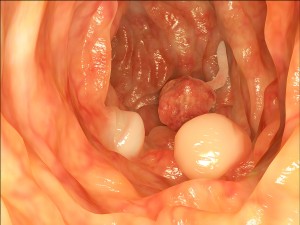Gastroenterologist Dr. Stephen O’Keefe of the University of Pittsburgh School of Medicine recruited 20 black men in the US and 20 men in rural South Africa. He did an experiment of only two weeks where he exchanged their diets. The African men in South Africa were fed American fast food, a diet high in fat with generous quantities of meat and cheese (fried chicken, burgers and fries). The American black men received the fibre rich traditional, rural South African diet, high in fiber and low in fat; it contained beans and cornmeal, plenty of fruits, vegetables and very little meat.
After the diet swap colonoscopies were performed on all of the volunteers. All of the American blacks who were on the fibre rich diet had no inflammation in the lining of the colon and the butyrate content in the stool, which was measured, was increased indicating protection against colon cancer. The bowel flora was healthy and protective of colon cancer.
In contrast the South Africans who had just consumed a two-week American fast food diet had increased inflammation of the colon, decreased butyrate content in the stool and an abnormal bowel flora consistent with an increased colon cancer risk.
It is important to remember that colon cancer is the second leading cause of cancer deaths. Colorectal cancer is diagnosed in 150,000 Americans every year. In rural Africa very few people get colon cancer.
Other researchers have also examined what foods are associated with a reduction in colon cancer; here are 19 of them (number 11 is missing).
The key is to increase lycopenes and fiber: ginger, barley, beets, organic red peppers, blueberries, papaya, salmon, carrots, okra, organic celery, turmeric, watercress, broccoli, sweet potatoes, raspberries, kale, Brussels sprouts, fish eggs and arugula. You don’t have to eat all of those, but choose what you like and eat it regularly.
Conclusion
What we eat has an enormous impact on the health of the colon and rectum, particularly as it accumulates over the years. High butyric acid and high fiber as well as lycopenes are the key to colon health. Avoid junk foods; eat mostly organic foods if you can, and eat some fish. This is how you prevent colorectal cancer.
More info on colon cancer: https://nethealthbook.com/cancer-overview/colon-cancer/







